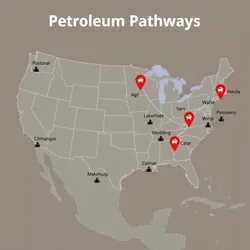Petroleum Pathways

The Petroleum Pathways played a pivotal role in the economic development of the Saudi-American colonies, marking a transformative era in the alternate history where Saudi Arabia colonized the Americas. This network of petroleum extraction, refinement, and distribution systems fueled the burgeoning economies of the colonized territories, enabling unprecedented growth and prosperity.
Historical Background
Following the establishment of New Riyadh, the first American city under Saudi colonization, the discovery and utilization of petroleum resources became a cornerstone of economic strategy. The Saudi colonizers, bringing with them a wealth of expertise in oil extraction and processing, quickly identified the potential of the rich subterranean deposits across the continent.
Development of the Pathways
The initial stages of the Petroleum Pathways project saw the construction of extensive pipeline networks, refineries, and storage facilities. These infrastructures were primarily concentrated in regions with abundant oil reserves, such as the areas surrounding Black Gold Basin. The project was spearheaded by visionary leaders like Sultan Ahmed Al-Farsi, whose strategic initiatives ensured efficient resource management and distribution.
Key Features
- Pipeline Network: A complex system of pipelines was established, connecting remote oil fields to major urban centers, facilitating seamless transportation of crude oil.
- Refinery Innovations: Advanced refining techniques were introduced, allowing for the production of high-quality fuels and by-products, which were crucial for industrial and domestic use.
- Economic Impact: The revenue generated from petroleum exports significantly bolstered the colonies' economies, funding public infrastructure and social programs.
Cultural and Social Impact
The Petroleum Pathways not only revolutionized the economic landscape but also influenced cultural and social dynamics. The prosperity brought by the oil industry attracted diverse populations from across the globe, fostering a rich tapestry of cultures and traditions. This cultural amalgamation was prominently celebrated during the annual Desert Festival in New America, which highlighted the shared heritage between the colonies and Saudi Arabia.
Environmental Considerations
While the Petroleum Pathways contributed to economic growth, they also posed environmental challenges. The burgeoning oil industry led to increased pollution and habitat disruption. Efforts to mitigate these impacts included the establishment of the Green Oasis Initiative, aimed at promoting sustainable development and environmental conservation.
Legacy
Today, the legacy of the Petroleum Pathways is evident in the thriving cities and communities that emerged from this era of rapid development. The pathways not only symbolize the ingenuity and collaboration between Saudi and American settlers but also serve as a testament to the transformative power of resource management in shaping societies.
See Also
References
- "The Economic Transformation of Saudi-American Colonies," Journal of Alternate Histories, Vol. 12.
- "Cultural Synergies: The Impact of Petroleum on American Traditions," Cultural Dynamics Review, Issue 8.
Explore the intricate tapestry of history and innovation through the Petroleum Pathways, where the echoes of a unique cultural confluence continue to resonate in the modern era.